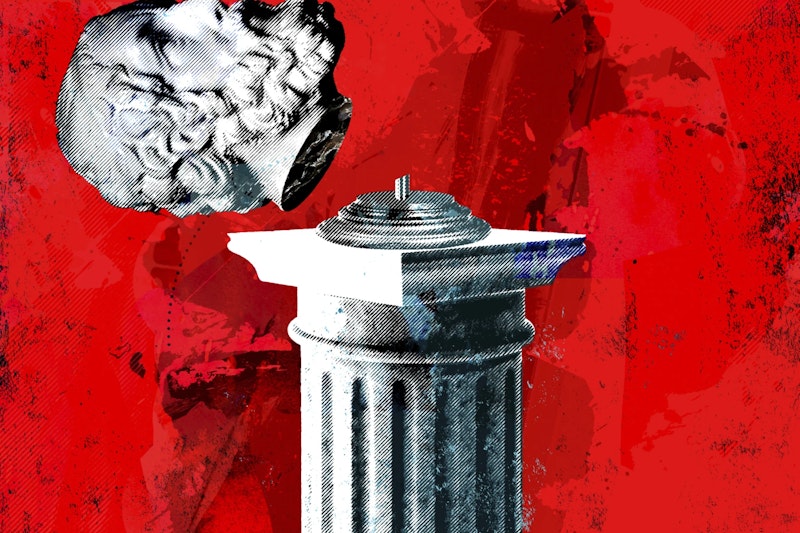Here's an excellent piece of data journalism summarizing the decline in humanities majors, assembled (appropriately enough) by a Harvard undergrad. We're reaching the point at which less than five percent of students major in such fields as philosophy, religious studies, literature, history, and languages. Colleges are eliminating departments; PhD's can't find jobs. There’s debate about the causes, and the trend is what we call "overdetermined," having more explanations than are necessary to account for the effects.
Some of these are familiar. Since the recession of 2008, people have been too worried about making a living or getting out of debt to fully immerse themselves in the dialogues of Plato. The humanities began to seem like luxuries we could ill afford.
Here's another stab. By the early-2000s, many Americans believed that humanities professors were far to the left of themselves and were inculcating these values in their children. Many professors had been trained in the "politically correct" humanities department of the late-1980s and early-90s by professors who in turn arrived in the 1960s. They weren't so much scribal types focused on difficult or obscure matters, but regarded their job as achieving social change through indoctrination. They were explicit about that until people started objecting. But in the course of my academic career (1989-2023), the sense of what we were about shifted, roughly from finding the truth to achieving social transformation.
Though the economics are key, I don't think politics is the main cause of the decline. It's a much wider matter of who we conceive ourselves to be and how our leaders have tried to define us. Above all, it has to do with the technocratic cult of standardized testing and the ideas about what education is for, promulgated by people like the Clintons, George W. Bush, Arne Duncan, Thomas Friedman, Bill Gates, and Barack Obama (who, remarkably, ended up having second thoughts). They reformed the ratiocination right out of American education, and couldn’t have been more explicit about it. Their vision of a rigid standardized curriculum, in which the purpose of human childhood is conceived to be filling in little bubbles on forms, exhausted the field for 20 years.
They called the programs No Child Left Behind, then the Common Core. In contradiction to the rafts of disingenuous hooey emitted around them, these were attempts by the federal government to impose a uniform curriculum across the country and to conceive children exclusively as producers of test scores, which was revealed in this regime to be the purpose of childhood or indeed of human life. You can design standardized tests to assess some things about literature, for example. Who wrote To Kill a Mockingbird? On the other hand, what does it mean? Standardized testing is far more appropriate to STEM fields.
The way it was sold was that American children were being out-competed by the children of Singapore and Finland; the achievement gap was a constant refrain. Bizarrely, this was even supposed to motivate parents and children. "There are millions of kids who are in modern suburban schools who don't realize how far behind they are," wrote that avatar of standardized technocracy Thomas Friedman. He really thought that if we could convince middle-schoolers outside Kansas City that they were "falling behind" little Singaporeans, they’d redouble their efforts to fill in little bubbles in the approved manner. I’ll say this: any parent who drove their kids extra hard because they were lagging behind the children of Helsinki was an idiot and a monster. Yes I do mean you, Arne Duncan.
When the technocrats talked about the achievement gap, they definitely didn’t mean that American children had fallen behind the little Danes or Taiwanese in their interpretation of Shakespeare or their mastery of the ethics of Immanuel Kant. They pictured a technological gap, a lack of engineers and computer programmers. They wondered who would fill Bill Gates' cubicles. So did Gates, a wild enthusiast for and driver of all these developments, in particular the Common Core. That the Obama administration was working on behalf of Gates' vision of the economy was something they said straight out. “Technocracy” is an accurate designation.
One thing Duncan and all the rest were strongly advocating was "teacher accountability," or making teachers into quality-assurance officers. They were to have no autonomy and no role in conceiving what was taught in their classrooms. Beginning with Bill Clinton and Al Gore and "building a bridge to the information economy of the 21st century," American education was dehumanized. They insisted on and celebrated education specifically as a process of dehumanization. The humanities never stood a chance.
In education, developments take a decade or so to play out, because a cohort or two of students need to work through the gulag before you can assess the results. The results here have been disastrous. By the end of his administration, Obama was completely rethinking this approach. Thanks, bro, but too late. By the time of their 2018 annual letter, Bill and Melinda Gates had come to regret the previous 20 years of their educational philanthropy.
The standardized achievement-gap approach failed in every possible dimension, including by its own absurdly narrow standards: test scores improved slightly, then sagged like mad. Education dehumanization meaninglessly constrained the lives of millions of children and teachers. It has helped drive a mass exodus to home schooling. It sought to crush humanity. But what it really did was crush the humanities.
—Follow Crispin Sartwell on X: @CrispinSartwell

